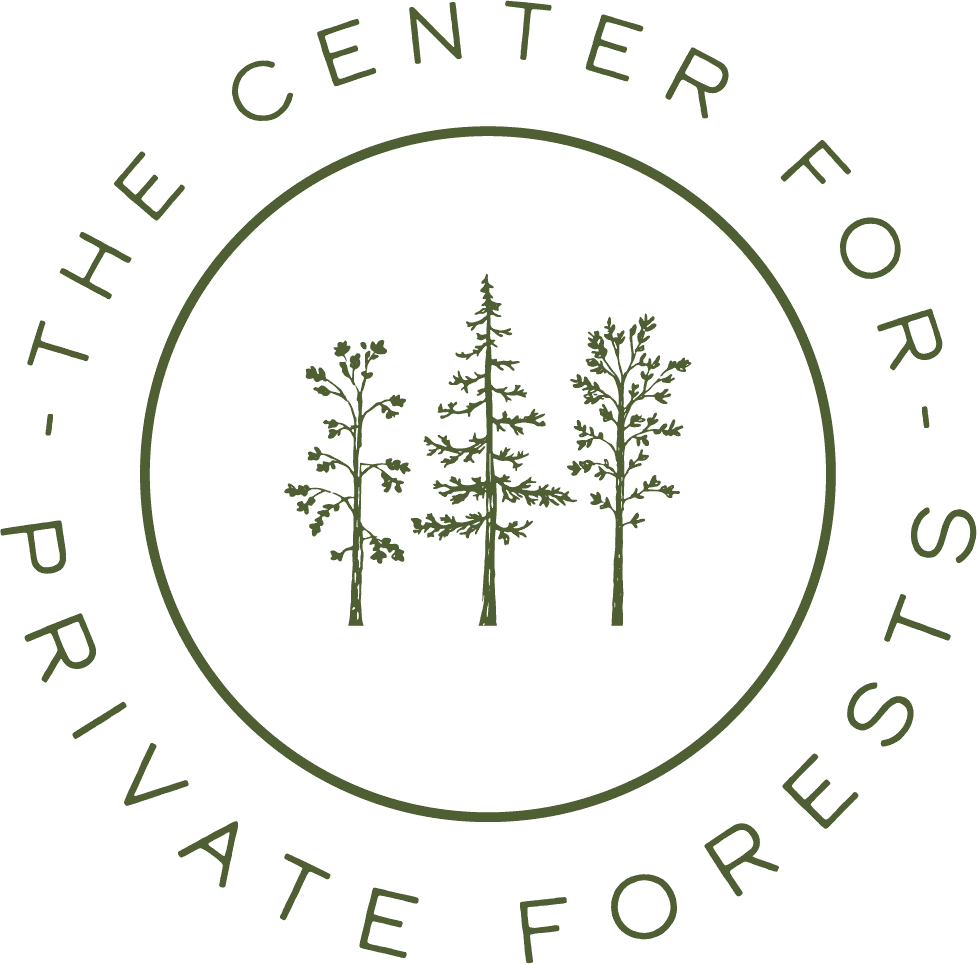Posted: April 9, 2021
As baby boomers enter their mid-50s to mid-70s, significant acreages of forestland will be changing ownership over the next 10 to 20 years, as they divest or pass assets on to their heirs or beneficiaries. The USDA Forest Service anticipates one-third of the forest landowner population will be making decisions about the future of their forestland in the next five years. With this anticipated surge in the transfer of ownership, timely legal, financial, communication, and conservation tools must be made more accessible and available to forest landowners as they plan the future of their land.

The Center for Private Forests logo
Since 2010, the Center for Private Forests has operated in this space, initially working to enhance family communications through the legacy planning process to help keep lands intact and functional as working forests. Out of initial efforts arose tools such as the Legacy Planning edition of the Forest Story Cards, created in conjunction with Sanford “Sandy” Smith, Teaching Professor and Natural Resources and Youth Extension Specialist; conversation guides; and resources to get landowners started in thinking about what happens to the land after them.
In 2015, the Center convened a Legacy Planning Working Group of landowners and interested stakeholders to review existing resources, determine their utility and accessibility for novice landowners, and to guide the creation of new resources that would best fit needs. Out of this effort, we pursued a northeast regional USDA Renewable Resources Extension Act National Focus Fund grant to create additional resources to guide landowners on their journey. Created as part of this project were a how-to guide branded to 10 different states, called “It’s Your Legacy” in Pennsylvania; a collection of stories from landowners who’ve made (or not made) decisions about the future of their land—the logistics of their land, their process, and the tools they use so that others could learn from their experiences; and a short whiteboard video to pique interest in the process and connect people to resources. All of the above resources can be found on our webpage, ecosystems.psu.edu/legacy.
Forest legacy planning continues to be a key applied research area for the Center. In 2019, we convened the second Forest Legacy Planning working group to better understand landowner reasons for engaging, or not engaging, in estate planning. Using this work, we applied for and were awarded a National Fish and Wildlife Foundation grant to create networks of experts and peer volunteer landowners who play key roles in the conservation-based estate planning (CBEP) process to guide landowners to and through the process. CBEP is an à la carte menu of standard estate planning tools and additional tools to keep lands intact and working and help current owners create plans that will get as much undeveloped land to a new owner in as big of an ownership as possible—whether the new owner is a known beneficiary or an unknown someone who will purchase the property.
| Some Legacy Planning Resources Find the “Legacy 101 Video” plus links to “It's Your Legacy” and “Legacy Planning Stories” with downloadable PDFs available at ecosystems.psu.edu/legacy. And, join us on Tuesday, June 8 at 12 noon or 7 p.m. for for a free live webinar, “Forest Legacy Planning: Moving Towards the Decision Point.” Register at https://extension.psu.edu/pennsylvania-forest-seminar-forest-legacy-planning-oving- towards-the-decision-point. |
Through workshops to build foundational knowledge about landowner values, estate planning processes, and available resources to help, the project will eventually create networks of financial and estate planning professionals, natural resources professionals, conservation professionals, and knowledgeable forest landowners within two focal geographies of the state (for now) to support implementation of legal and financial tools for successful plans, transferring stewardship ethic along with assets.
Our first workshop was held March 9 with natural resources professionals. Forty-two foresters and natural resources professionals attended a virtual program wherein we shared the basics of CBEP and resources for them to use to support their landowners and clients, and held a considered discussion of how best to incorporate this skill set and knowledge into their toolkits and business practices. Ahead are virtual workshops with conservation professionals, planning professionals, and landowners, the creation of several new resources to support the different communities involved in CBEP, and community-building to support successful transitions for interested landowners in the future.
In 2021, in addition to continuing our workshops and networking efforts, we are reconvening the Forest Legacy Planning Working Group to help guide the creation of the workshop curriculum for forest landowners and advise on resources, including the potential creation of a decision tree to step landowners through the process and support their journey with needed resources and connections to educated professionals. There is much more work to be done in this space. We look forward to continuing to create innovative opportunities and projects expanding resources and guidance to help landowners plan well for their forest’s future.
Contact Information

- Director, James C. Finley Center for Private Forests at Penn State
- Email abm173@psu.edu
- Office 814-865-3208
James C. Finley Center for Private Forests
Address
416 Forest Resources BuildingUniversity Park, PA 16802
- Email PrivateForests@psu.edu
- Office 814-863-0401
- Fax 814-865-6275
James C. Finley Center for Private Forests
Address
416 Forest Resources BuildingUniversity Park, PA 16802
- Email PrivateForests@psu.edu
- Office 814-863-0401
- Fax 814-865-6275

